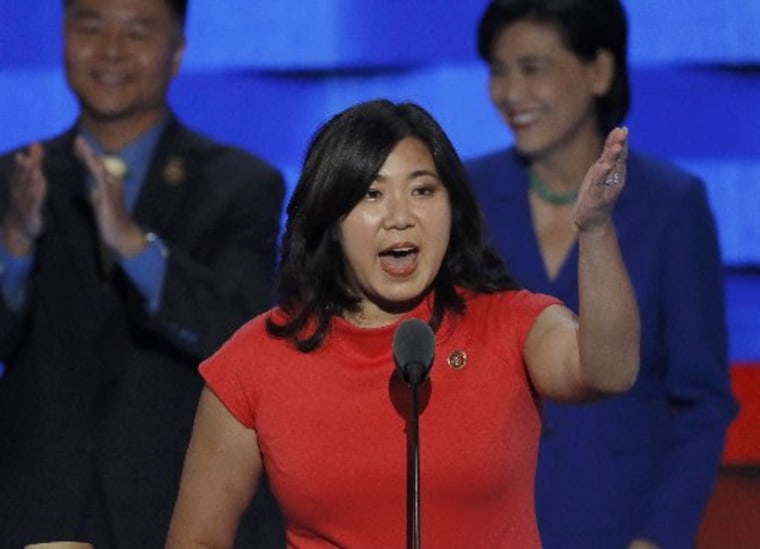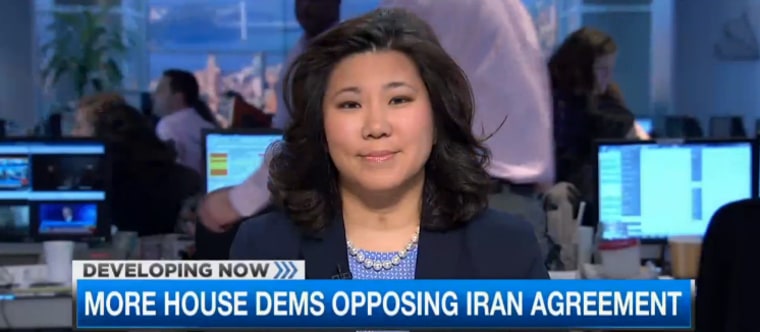U.S. Rep. Grace Meng (D-NY) — currently the Democratic National Committee’s only Asian-American officer — is hoping to help steer her party in a new direction if she wins reelection as a vice chair this weekend in Atlanta, Georgia, the congresswoman told NBC News.
“Obviously since the last general election, we have a lot more work to do,” Meng said. “So I feel like I have something to add to that process and would love to help the party going forward.”

The winter gathering, when DNC members vote in their officers, comes as Democrats regroup in the wake of President Donald Trump’s November victory, which surprised many. While much attention of late has been on the selection of a new DNC chairman, some nine candidates as of Wednesday afternoon were also vying for vice chair positions, Meng said.
RELATED: Rep. Grace Meng Elected Vice Chair of Democratic National Committee
Meng has held one of those five slots since late July when party members unanimously elected her shortly after the DNC convention in Philadelphia. The spot had been vacant since former vice chair Rep. Tulsi Gabbard (D-HI) resigned from it last February.
Meng said outreach to emerging and immigrant communities and working with millennials are among the areas she’ll continue to focus on if reelected. She also said she wants to use ethnic media to engage groups often overlooked by the DNC.
“Whether it’s the Chinese or Vietnamese newspapers, or whether it’s in-language radio outlets, the DNC was not touching those,” Meng said. “These are groups of constituents and voters that we should be reaching. I believe the [Republican National Committee] puts efforts and resources into many of these outlets, so our party should be doing at least what the RNC is doing.”
RELATED: As Asian-American Electorate Grows, GOP Aims to Turn Local Wins National
In recent years, the RNC has made a concerted push to win back Asian Americans, a bloc that once gave 55 percent of its vote in 1992 to former President George H.W. Bush, according to Cornell University. Those efforts have included using social and ethnic media, as well as going door to door, to find voters receptive to the Republican message.
“If left untouched, we don’t know what will happen, and we can’t just take the Asian-American community for granted.”
Former Democratic candidate Hillary Clinton still toppled Trump among Asian Americans, securing 79 percent of their vote, according to an Asian American Legal Defense and Education Fund exit poll.
But a nonpartisan survey released in October found that more than 1 in 5 Asian Americans were undecided before the election. Asian Americans last year made up around 4 percent of the nationwide electorate, according to Pew Research, and are the fastest growing racial group in the country.
RELATED: Opinion: Effective Asian American and Pacific Islander Voter Engagement Must Continue
Despite Clinton’s success with Asian-American voters, Meng said she was concerned about the RNC’s efforts to woo that electorate.
“When you’ve seen many Asians in the past lean Democratic, it’s not just a coincidence,” she said. “I think a large reason is because we’ve seen more Democratic Asian candidates across the board, and that has also helped increase alliances between the Democratic party and the Asian-American community.
“If left untouched, we don’t know what will happen, and we can’t just take the Asian-American community for granted,” she added.
One initiative Meng mentions in her vice-chair platform is a permanent surrogate program similar to the framework for presidential cycles when people are dispatched across the country to speak on behalf of candidates.
Through her proposed program, Meng said she wants to match up party members, House representatives, and volunteers with the needs of state parties.
“There’s no reason why we shouldn’t be able to do that long term,” Meng said. “A lot of Congress members travel anyway, so whether it’s adopting a certain state, adopting a certain district, and just making sure we’re not just popping up in August and September of an election year and saying, ‘Hey, vote for me because I speak your language’ — it has to be beyond that.”
“Obviously since the last general election, we have a lot more work to do. So I feel like I have something to add to that process and would love to help the party going forward.”
Come this weekend, all eyes will be on the race for DNC chair.
Meng, one of the 447 voting DNC members, said she hadn’t decided whom she will choose as chair. The two frontrunners were Rep. Keith Ellison and former Labor Secretary Tom Perez.
As for the vice chair election, it will be the very last one on Saturday, Meng said. The contest is held in rounds, and any candidate who earns 50 percent plus one in the first round automatically wins, she said.
But with nine candidates in all, the likelihood of that happening is slim, Meng added.
Assuming no one earns the 50 percent plus one, the candidate with the least number of votes in each round is dropped, Meng said. The process repeats until a winner is decided.
“We’re going to be there all night,” Meng said, laughing.
Follow NBC Asian America at Facebook, Twitter, Instagram, and Tumblr.
